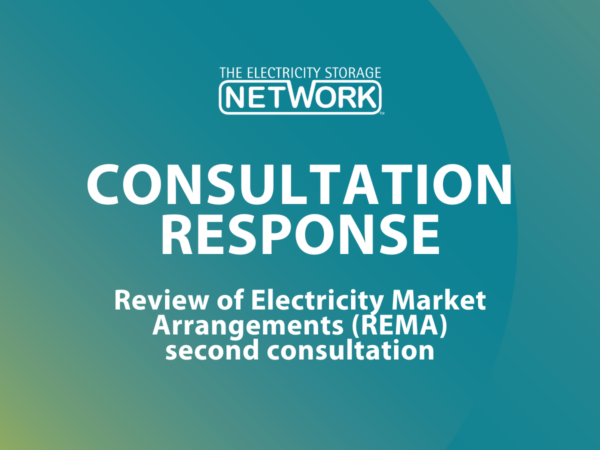The Electricity Storage Network has responded to the second REMA consultation, calling for more details ahead of any final decisions in mid-2025.

The Electricity Storage Network has responded to the second Review of Electricity Market Arrangements (REMA) consultation. Following two years of hard work led by DESNZ, there has been progress in key areas, such as the Capacity Market. However, there remains a lot of uncertainty, and further details and industry consultation are needed on some of the options put forward ahead of final decisions in mid-2025.
Thanks to all those members who engaged with us over the last few months through our REMA working group, members workshop and through separate meetings.
Below is a summary of ESN’s key messages:
The case for a zonal wholesale market
- From our engagement with the GB electricity storage industry so far, there is not a consensus in support of a shift to a zonal wholesale market system. The industry is keen to see a detailed design for a zonal market in GB in order to be able to fully assess the potential impacts. This should include more detail on the number of zones and period for review, as well as impacts on embedded/distribution assets and intra-zonal impacts (as well as inter-zonal).
- ESN does not support central dispatch and judges that the operator/optimiser is best placed to understand and dispatch assets in the GB market.
- ESN supports shorter settlement periods, as the change aligns with the fast-acting capabilities of electricity storage technologies and their inherent flexibility. We think shortening gate closure should be retained as an option, as maintaining the current one-hour period would limit the potential benefits of a shorter settlement period.
Balancing Mechanism reforms
- We ask that Ofgem continues to monitor progress and hold ESO accountable for the pace of BM reforms, widening the role of low-carbon flexibility in the BM.
- We also ask that ESO publishes further datasets on transmission constraints to increase transparency ahead of the Centralised Strategic Network Plan.
- ESN calls for accelerating the timeframes to implement new storage parameters in the BM for limited-duration assets (Grid Code 0166).
New constraint management services
- ESN is very supportive of the development of new constraint management services, and several members have contributed to the collated list of market-based solutions in the ESO Thermal Constraints Collaboration project. We want to ensure this project shifts quickly to implementation and that oversight from Ofgem and DESNZ is maintained.
Capacity Market
- ESN supports low-carbon minima with wider reforms of de-rating factors and Capacity Market governance. ESN would like to have more specifics on how the low-carbon minima and the desirable characteristics would work in practise and the implications for the existing de-rating methodology.
Contracts for Difference reforms
- ESN members have flagged concerns that the impacts of potential CfD reforms, such as deeming, on ancillary services and the Balancing Mechanism have not been assessed in any detail. Significant changes to the market dynamics could undermine current business models and potentially reduce the deployment of low-carbon flexibility, making it very challenging to deliver government low-carbon flexibility requirements. We are, therefore, calling for further detailed analysis to be carried out.
Wider recommendations
- ESN is asking for an overall target to be set by the government for grid-scale electricity storage capacity for 2035 in collaboration with ESO and industry.
- ESN is calling on DESNZ to reconsider the decision to drop giving the ESO/NESO the ability (or an obligation) to prioritise zero/low-carbon procurement in the REMA process.
- ESN believes there is a strong case for an update to the Smart Systems and Flexibility Plan, that aligns with REMA options and progress so far.
The ESN response is available to read here and below.
The Regen response is available here.
